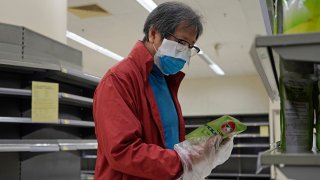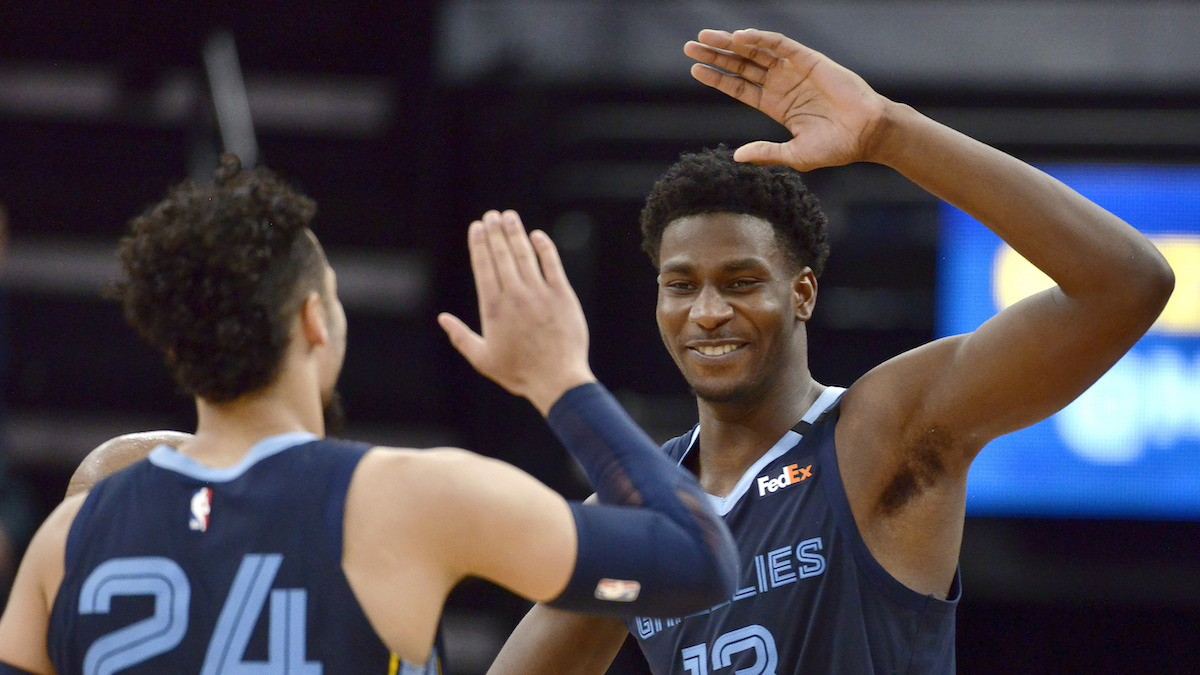
There were 88 reported cases of coronavirus in the United States as of Monday and more than 80,000 worldwide. This scare has led to a spike in sales of products Americans think will help them avoid the virus.
Hand sanitizer from Bath & Body Works, for example, has had a bump in sales, according to Fortune, as have medical masks at Walgreens, Home Depot, and Lowe’s, according to NBC News. Amazon is experiencing a shortage in Purell hand sanitizer, with most sellers saying their stock is "currently unavailable."
Grocery delivery service FreshDirect has also seen a surge in orders the company believes to be coronavirus-related. Sales of "fresh seafood, fresh chicken, baby food, baby and family health products as well as household cleaning and disinfectant items" have all increased, FreshDirect told CNBC in a statement.
If you want to protect yourself, it's important to know what to stock up on and what may be a waste of money. Here are two products medical experts say you shouldn’t bother buying because they won’t protect you, and three products that can help and may be worth the money.
Don’t buy: Masks
Coronavirus is a respiratory virus, mainly spread through coughing. There are two types of masks you can get, and neither of them will help, says Dr. Amy Edwards, a pediatric infectious disease specialist at University Hospitals who works with the UH Roe Green Center for Travel Medicine & Global Health.
The standard surgical mask you would get at a drug store will keep you from spreading germs to others because it will "prevent spray from coming out," Edwards says. However, it won’t keep you from breathing in germs. "Those very fine [germ] particles can still make it through those little holes in your mask so it doesn’t prevent spread [of viruses]," she says.
The second kind of mask is called an N95 respirator mask. These are the ones used by medical professionals. However, N95 masks must be fitted properly at a hospital, Edwards says. If they are not, they are not effective. "If you go buy some random one, it’s going to have gaps in it," she explains, "and you’re looking at the exact same problem" as presented by drugstore surgical masks.
Edwards wouldn’t recommend buying a fitted one, either, though. "N95 masks are expensive and uncomfortable, so I wouldn’t waste your money."
Ultimately, she says, masks should only be worn by those who are already sick. They are not an effective precaution. "It’s not going to help you not get sick, but if all the companies are bought out and there are none left, the people who need it are not going to be able to get it," she says.
U.S. Surgeon General Jerome Adams echoed that sentiment on Twitter Saturday. "Seriously people," Adams wrote, "STOP BUYING MASKS!"
Don’t buy: Zinc
Zinc is a mineral that boosts your immune system and a common ingredient in over-the-counter products designed to fight and prevent colds. While it might seem like a good time to buy zinc supplements, Edwards says they won’t actually help. "Most Americans who eat fruits and vegetables are zinc sufficient," she says.
The excess zinc will not boost your immune system as your body will flush it out, she says.
Buy: Fruits and vegetables
If you want to keep your immune system strong, diet and lifestyle choices can make a real difference. Eating a diet high in fruits and vegetables, Edwards says, can help. So can getting eight hours of sleep every night.
"That’s the way to get through flu season," she says. These habits are "not only good for your heart, it’s good for your immune system too."
Some experts also recommend stocking up on foods you usually prefer when you’re sick, like chicken noodle soup or hydrating sports drinks. That way, if you do fall ill, you don’t have to leave the house.
Buy: Soap
For the most part, any guidance you’ve heard about avoiding the flu is the same advice given to avoid the coronavirus. "There’s nothing special about this virus compared to other viruses," Edwards says.
That’s why the most common advice for avoiding coronavirus is washing your hands with soap and water. Experts say any soap will do; it doesn’t need to be antibacterial.
Hand-washing is something you should do frequently, says Lynelle Phillips, a registered nurse and assistant professor at the University of Missouri school of health professions. She suggests singing "Happy birthday" while washing your hands to ensure that you’re cleaning them thoroughly.
"That’s helpful for all manner of viral and bacterial illnesses," Phillips says. "We have a fair amount of influenza going around and that does kill tens of thousands of people every year."
Buy: Hand sanitizer
Hand sanitizer is an effective way to disinfect when there’s no sink in the vicinity — say, when you exit a crowded bus after your commute, or get into your car after a trip to the pharmacy. "There is no evidence that this virus is alcohol-resistant," Edwards says.
Keep a bottle in your purse or pocket, especially in an office setting. "If you have to be in a meeting where you’re shaking hand and interacting with people, when you’re done, clean your hands," Edwards says.
More than likely, however, there is no need to buy too much of anything, experts say. "I do not think that there is going to be a massive coronavirus outbreak in the United States, so my advice would be to be vigilant, but calm, and not to panic," Edwards says.
If you do contract a cough or any illness, the best thing you can do is quarantine yourself. That’s why it's important to talk to your workplace about the options for working remotely or taking paid sick leave in the event of a local outbreak.
"There are a lot of jobs out there that do not have sick leave so people feel like they cannot stay home because they cannot afford to stay home," Phillips says. "That’s the kind of circumstance that will promote the transmission of disease, more so than wearing a mask or not."
This article first appeared on Grow. More from Grow:



